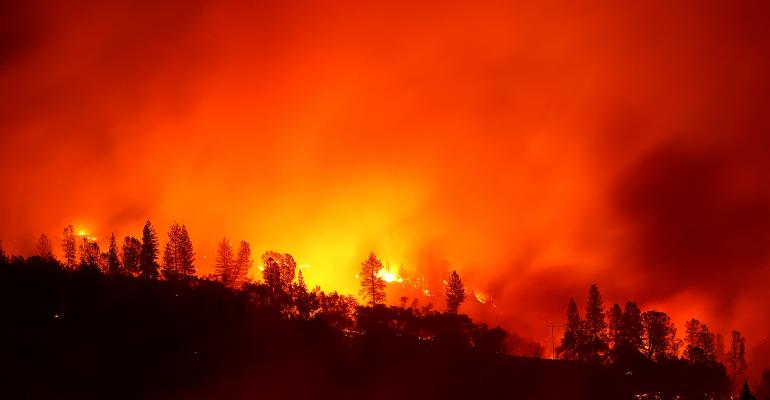I guess it’s a part of human nature that people tend to be self-congratulatory. We look at all the advancements we’ve made (consider technology and industry alone), and our mastery of the world is clear—and clearly the reason for boasting.
That is, until Nature decides to show us how tenuous that control over our environment is. In the blink of an eye, the comforts to which we’ve grown accustomed can be literally washed or blown away, plunging us all into a primitive darkness.
As stark as that picture might be, the global headlines bear out its truth:
- The May 3 eruption of the Kilauea Volcano destroyed hundreds of Hawaiian homes and, according to Forbes, the total volume of lava exceeded that from three of the largest eruptive events in the area over the past two centuries. (And as of this writing, Hurricane Lane, though downgraded, has dumped some 52 inches of rain on the islands.)
- Back in the continental U.S., California this year sustained what’s considered to be the worst series of wildfires—more than 5,000 by some sources—in the state’s history. Ironically, sadly, that’s what they thought in 2017. As the Journal of Property Management documented earlier this year, it was the devastating wildfires of last year that Governor Jerry Brown would describe as “one of the greatest tragedies California has ever faced.”
- That same issue of JPM recounted the story of Hurricane Harvey, a category-four storm that struck Texas in August of last year. The storm came packing 180-mile-an-hour winds and pushing a storm surge of up to 13 feet. It left in its wake a record-tying (with Katrina) $180 billion in damages and 82 deaths. (The September issue of the magazine will carry this coverage farther, with disaster-preparedness tips for earthquakes and hurricane winds.)
In a very real sense, for the nation’s stock of multifamily and commercial assets, property managers are the first line of defense against such devastating turns of nature. This is true both at the individual property level and nationally.
At the asset level, emergency preparedness is obviously key to ensuring life and property safety, and no matter the event, there are certain basic guidelines that hold true. To that extent, preparedness is also good business; in fact, it can be a cost-saving strategy, at the very least in terms of occupant retention when the emergency is handled with professionalism and thought.
But it is also a cost. As pointed out in the IREM handbook, Before and After Disaster Strikes, “There will be upfront costs for emergency equipment and printing of emergency procedure manuals, in addition to costs incurred for the amount of time your staff spends creating the plan.” Thorough prep, the book points out, may also call for upgrades in building systems, everything from sprinklers and alarms to windows.
“Further costs may be incurred if professional consulting services are solicited,” the book warns. Key among them would be an attorney—if the prep is done properly—because she or he, “can advise whether there are laws regarding public access or other issues that might affect your actions and/or liabilities in an emergency.”
Sounds burdensome? Consider then that, “Liabilities may also arise if you do not have an emergency plan in place or do not implement a plan to protect people and property.”
But ensuring that all of the necessary steps—the communication protocols with occupants, the close coordination with public first-responders and the means to restore operations rapidly--are only part of the responsibility the property manager carries.
And they cannot carry that burden alone. Therein lies the national awareness. A major imperative is the ongoing, in-place support of those efforts and assets that can come only from the federal government. Nowhere is that imperative clearer than in the move to create a permanent National Flood Insurance Program.
The good news here is that Congress has extended the program through November 30 of this year. But that, frankly, is not enough, and IREM is making that statement to our legislators in both national forums in Washington, D.C., and on the local level, where members around the country are meeting with their representatives away from the hustle and bustle of the nation’s capital.
And the message we’re relaying is constant. More is needed, and a long-term reform bill should include reauthorization for at least five years; an increase in affordability through annual rate caps and lower surcharges; directing FEMA to develop more granular rate tables that better align rates with actual risk; funding of loans and grants to help mitigate flood risk; and increased access to private-market flood insurance.
One need look no farther than the devastation of Hurricane Harvey, or the July downpours in southwestern Japan that caused massive landslides and loss of lives and property, to gauge the dire impact a flood can have.
Obviously, Japan certainly would not be impacted by NFIP, but the devastation of the area proves that no location is immune. That event only underscores the need for ongoing protection here in the states.
Japan happens to be one region of the world where professional property management is growing and doing so at a rapid pace. And therein lies another message about disaster preparedness. In a very real sense, what happens there happens to all property managers. The lessons taught by such tragedies, whether they occur in California, Texas, Hawaii or Japan, inform us all. As a community of professionals, we learn and we grow from one another.
From our individual hardships, the community finds its collective strength.
Don Wilkerson is 2018/2019 president of the Institute of Real Estate Management. In addition, he serves as president and CEO of Gaston and Wilkerson Management in Reno, Nev.

